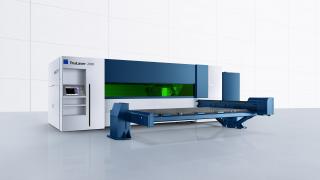
Easy entry to laser cutting // High productivity at low investment and operating costs // Intuitive operation reduces amount of training needed
TRUMPF is selling a new laser cutting machine, the TruLaser 2030 fiber. Its intuitive operation, low investment and operating costs make it particularly suitable for the needs of businesses starting out in laser cutting. Equipped with up to four kilowatts of laser power, it is remarkably productive. If required, the TruLaser 2030 fiber is also capable of fully automatic manufacturing.
Intuitive operation reduces amount of training needed
Only 7.8 x 5.9 metres of installation space is required for the TruLaser 2030 fiber, including pallet changer. Important components such as the switch cabinet, suction system and laser are built into the machine frame. The three-metre working area is easily accessible along its whole length and is designed for large formats. Large windows and LED illumination provide optimum views inside the machine. The TruLaser 2030 fiber fulfills all requirements with regard to laser safety.
Its ease of operation meets the needs of newcomers to laser cutting. If the operator of the TruLaser 2030 fiber wants to assign a job, the relevant questions for setting up and programming the machine appear on the control user interface. The user is guided by the interface through the various steps until the program starts. TRUMPF cutting parameters for all materials and sheet thicknesses are stored on the machine prior to delivery. Together with its intuitive operation, this significantly reduces the amount of requisite training. Cutting programs can be easily transferred to the TruLaser 2030 fiber using a network or USB drive. In practically no time, drawings can be created directly on the machine and converted into cutting programs.
Machine dynamics, short setup times and automation solutions increase productivity
TruLaser 2030 fiber is available with two, three or four kilowatts of laser power. It displays its strengths especially in sheet thicknesses from one to twelve millimetres, where it cuts very fast. It also processes thicker sheets. Thanks to the robust TruDisk solid-state laser, the TruLaser 2030 fiber can cut highly reflective materials such as copper even using nitrogen.
All materials and sheet thicknesses can be processed with the same cutting unit. This saves setup time, as there is no need to change the lens and cutting head. Along with other parameters, the focal position of the laser also adjusts automatically to the respective material. The cutting head’s collision protection and an automatic nozzle changer with space for eight nozzles reduce setup times even further.
Depending on the capacity utilization and the degree of automation wanted, the machine is available with a pallet for manual loading and unloading, a pallet changer or LiftMaster Shuttle. The retrofittable LiftMaster Shuttle makes it possible to load and unload the machine on a fully automated basis. Available in many different installation versions, the TruLaser 2030 fiber adapts perfectly to the material flows and space conditions of the manufacturing operations at hand.
Configurations for various application scenarios
The various laser-power options and material-flow solutions permit different application scenarios. Equipped with two kilowatts of laser power and a manual pallet, the TruLaser 2030 fiber works cost-effectively even at lower utilization rates. The combination of three kilowatts of laser power and a pallet changer increases application flexibility and productivity. Thanks to the increased laser power, it is possible to process thicker sheets. Using the pallet changer, the machine works efficiently in one- or two-layer operation; material changes take only 45 seconds. Meanwhile, the TruLaser 2030 fiber with four kilowatts of laser power, automatic nozzle changer and LiftMaster Shuttle is ideally suited for continuous operation.
To increase the capacity utilization of the laser and to reduce the investment costs, the machine can also be operated in a laser network. To this end, the TruDisk laser has an additional output as an option. In this way, the laser can supply an additional machine or welding cell as well as the TruLaser 2030 fiber. This reduces procurement costs for the second laser and facilitates the entry into new technologies such as laser welding or laser tube cutting.